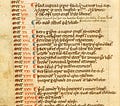Tackling the information challenge
It's difficult for us to understand the information scarcity of previous ages, even as we seem to have unlimited access to information and evidence about the past.
Between networks and nodes, we tend to forget the importance the ancients placed on reliable info. Military and cultural wars have long been fought because of suboptimal knowledge.
Two groups c…
Keep reading with a 7-day free trial
Subscribe to Biblonia to keep reading this post and get 7 days of free access to the full post archives.


